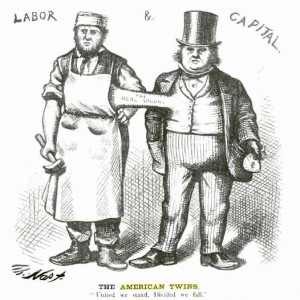 On October 30, I participated in a presentation entitled “Supreme Court Roundup” with Ilya Shapiro of the Cato Institute. The event was sponsored by the Law School chapters of the Federalist Society and the American Constitution Society. We discussed three significant cases from the 2013-2014 Supreme Court term: McCutcheon v. FEC, Burwell v. Hobby Lobby and Harris v. Quinn. It was a spirited discussion, in which Mr. Shapiro and I presented opposing views, but I want to thank Mr. Shapiro for taking the time to visit the Law School and for sharing his perspective with the students.
On October 30, I participated in a presentation entitled “Supreme Court Roundup” with Ilya Shapiro of the Cato Institute. The event was sponsored by the Law School chapters of the Federalist Society and the American Constitution Society. We discussed three significant cases from the 2013-2014 Supreme Court term: McCutcheon v. FEC, Burwell v. Hobby Lobby and Harris v. Quinn. It was a spirited discussion, in which Mr. Shapiro and I presented opposing views, but I want to thank Mr. Shapiro for taking the time to visit the Law School and for sharing his perspective with the students.
This is the third and final blog post on the presentation. Readers can find the first post here, and the second post here. What follows are my prepared remarks on Harris v. Quinn, and also a brief conclusion regarding the three cases. Readers interested in Mr. Shapiro’s position on the case can refer to the amicus brief that he filed on behalf of the Cato Institute.
The case of Harris v. Quinn involved an Illinois law that made home health aides state employees under the Illinois Public Labor Relations Act. As a result of this law, these workers became joint employees of both the private individual who receives the services of the home-health worker and the State of Illinois. The Service Employees International Union (SEIU) represents home health aides under a contract with the State of Illinois and collects mandatory dues from both union and non-union workers, which are called “agency fees.” Persons who have a negative view of organized labor object to agency fees because they compel people to pay money to an organization to which they do not belong. Persons who have a positive view of organized labor support agency fees because they prevent non-union employees from “free riding,” which occurs when non-union employees receive the benefits of union-negotiated employment contracts without contributing to the cost of negotiating them.
Under existing precedent, a government employer who collects agency fees from non-union members does not violate their First Amendment rights because when the government acts as an employer it has a compelling interest in avoiding conflicting demands for wages and employment conditions from competing groups of employees. Abood v. Detroit Board of Education (1977). The plaintiffs in the Harris case wanted to use their lawsuit to overturn the Abood decision, thereby allowing any government employees who are not union members to work for the government without paying agency fees to a public employee union.
 A lawsuit filed in federal court by a sitting Chief Justice of a state Supreme Court against her colleagues is certainly unusual, if not unprecedented. The reaction to the filing of the complaint in Abrahamson v. Neitzel by the mainstream media has ranged from viewing the lawsuit as comedy (The Milwaukee Journal Sentinel: “Will the Real Chief Justice Please Stand”) to viewing this latest development as part of an ongoing tragedy (The New Yorker: “The Destruction of the Wisconsin Supreme Court”). However, the legal question at the heart of the Chief’s lawsuit is actually quite interesting.
A lawsuit filed in federal court by a sitting Chief Justice of a state Supreme Court against her colleagues is certainly unusual, if not unprecedented. The reaction to the filing of the complaint in Abrahamson v. Neitzel by the mainstream media has ranged from viewing the lawsuit as comedy (The Milwaukee Journal Sentinel: “Will the Real Chief Justice Please Stand”) to viewing this latest development as part of an ongoing tragedy (The New Yorker: “The Destruction of the Wisconsin Supreme Court”). However, the legal question at the heart of the Chief’s lawsuit is actually quite interesting.
